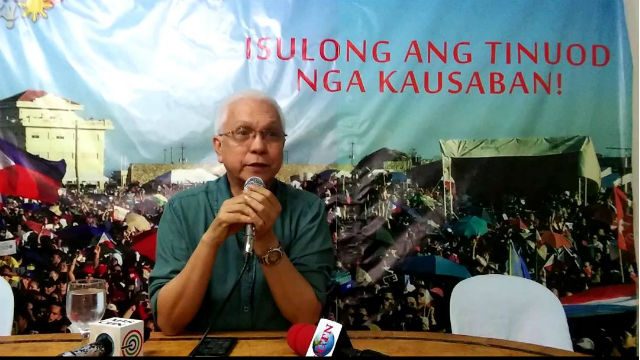SUMMARY
This is AI generated summarization, which may have errors. For context, always refer to the full article.

CEBU CITY, Philippines – Cabinet Secretary Leoncio “Jun” Evasco said that while he is personally for human rights, advocating it will be unpopular if governance is not working.
“Advocating human rights is always correct. But advocating for human rights when the 5 pillars of justice have collapsed, will be unpopular,” Evasco said during a media conference here on Saturday, October 1.
“I’m not saying it’s wrong, but you will be unpopular, why? Because your advocacy for human rights will always be perceived [as you being] on the side of the criminal,” he said.
Evasco was in Cebu City to attend the launch of Kilusang Pagbabago (movement for change). The group seeks to promote participatory governance among citizens in the Visayas.
Before accepting the position of Cabinet Secretary, Evasco served as the mayor of Maribojoc, Bohol from 2007 to 2016.
Evasco was also a member of the New People’s Army in the 1970s before he was arrested. It was Duterte who prosecuted Evasco, but later recruited him to serve as campaign manager for his mayoral bids in Davao City, and then as chief of staff.
“As Christians, we are not against human rights. I am myself in favor of human rights. But it will not be a popular advocacy,” he said in Bisaya.
‘Unpopular’
Evasco also served as Duterte’s campaign chief during the 2016 presidential elections.
Evasco explained further why human rights advocacy is unpopular. “Kon mu-advocate ka’g human rights na daghan kaayo’g biktima na wa gitagad sa pulis, wa gitagad sa piskal, wa gitagad sa huwes, kon advocacy for human rights, i-consider gyud na naa ka sa side sa criminal.”
(If you’re advocating for human rights when there are still many victims who the police, prosecutors and judges are not paying attention to, you will be considered as being on the side of the criminal.)
He added, “Ikaw, musuko jud ka. Dili lang ikaw pero tanan nga biktima, dili jud mo malipay. Mao nga, si Duterte niingon nga, ang iyang trabaho karun, subay sa mandato sa tawo.”
(You would be angry too. Not just you, but all of the victims wouldn’t be happy. This is why Duterte has said that his work and focus now is dictated by the mandate of the people.)
Since the war on drugs began on July 1, about 3,566 people have been killed. Of that number, 1,323 were killed in legitimate police operations while 2,233 were summarily executed in vigilante-style killings. (READ: IN NUMBERS: The Philippines’ war on drugs)
Breaking ties
The United States, European Union and the United Nations have all issued statements on the administration’s war on drugs. Duterte has reacted negatively to all of the statements.
“Kaya ako nagmumura. Akala mo, with all their pontification – ‘pag sila marunong tayo binababoy? Bakit ganoon?” Duterte said last September 22.
(That’s why I curse. You’d think, with all their pontification – just because they are educated, they can be disrespectful? Why is it like that?)
Evasco, who had just returned from a trip to Vietnam with Duterte echoed the president’s statements, saying that America doesn’t have a right to meddle in the affairs of a sovereign state.
“America and the Philippines are both sovereign states,” Evasco said in Bisaya. “The difference is they are rich, we are poor, but that doesn’t give them a right to dictate how we run our affairs.”
US Senator Patrick Leahy warned the Philippines over further conditions on US aid to the Philippines as a result of the extrajudicial killings. The President had also said the country is “about to cross the Rubicon” or “the point of no return” with the US. While not breaking ties with America, Duterte said he would strengthen ties with China and Russia, and other allies.
Evasco said this should not give Filipinos reason to worry.
“Vietnam was impoverished when the Americans were there,” Evasco said. “The Vietnam war ended in 1975. They were very poor when the Americans left, but now they’re far ahead of us,” he added.
Evasco explained in Bisaya: “Being a lapdog of America is not a guarantee that you will develop. Perhaps you’ll develop your poverty? Look at Vietnam now, it’s no longer a part of America or France. Where do we get the rice we eat? Vietnam. It’s very organized there. The traffic is organized and so are the sidewalks.”
“This is what the people want,” Evasco said. He said that Duterte promised a war on drugs and corruption during the campaign, so being elected on that platform makes it the “people’s mandate” as well.
“Dili mahuman aning war against drugs hangtud sa katapusan nga drug pusher mamatay,” he said. (This war on drugs will not end until the last drug pusher is finished.) – Rappler.com
Add a comment
How does this make you feel?
There are no comments yet. Add your comment to start the conversation.